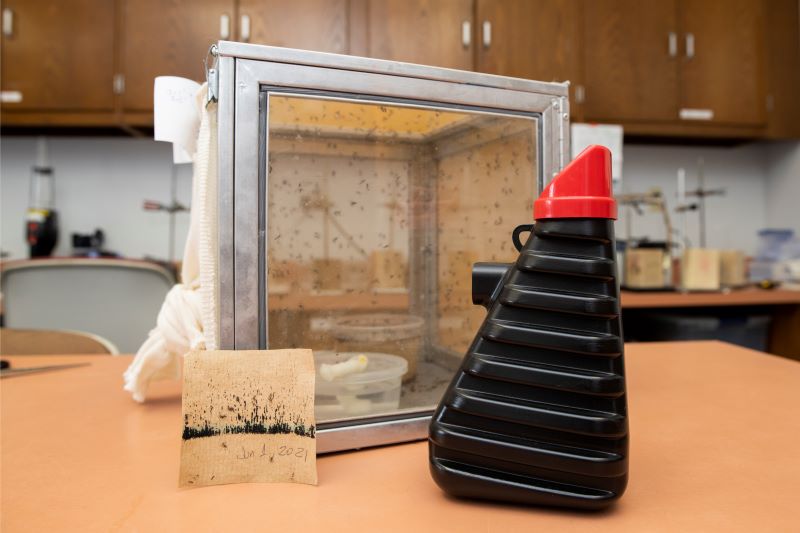UF start-up helps fight mosquitoes in areas hit hardest by Hurricane Ian
A product developed in a University of Florida lab designed to protect American soldiers from insect-borne diseases is helping wage war against the surge of mosquitoes in areas hardest hit by Hurricane Ian.
The Inzecto Mosquito Trap, co-created by Phil Koehler, a UF distinguished professor in the department of entomology and nematology, is an easy-to-use, environmentally friendly, and effective mosquito-killing device. The Gainesville-based company donated 100,000 traps this week to communities struggling with large populations of mosquitoes due to the floodwaters left behind by the hurricane’s rain and storm surges.

The Inzecto Mosquito Trap (black, red top) sits in a UF lab where it was invented alongside a container of live mosquitos. Photo by Tyler Jones UF/IFAS Photography
“The Inzecto trap is designed to provide protection and relief from mosquitoes after major weather events like Ian where there is limited or no power,” said Koehler. “The trap does not need electricity to work – it only needs to be filled with water, placed in shade and left undisturbed. There is no spraying or zapping. Beneficial insects like bees and other pollinators are not attracted to the trap.”
The traps have been deployed in four Florida counties, including Orange, Lee, Charlotte and Collier. The $2.3-million donation supplements the counties’ efforts with air and ground assaults through their mosquito control divisions. Inzecto has joined forces with partners, including the UF/IFAS Extension offices, Florida Master Gardner Volunteer programs, mosquito control districts and county parks and recreation centers to distribute the devices.
Koehler, who invented the trap in UF’s urban entomology laboratory with involvement from UF entomology professor Roberto Pereira and Chris Batich, a professor in the department of material science and engineering, said the commercialization and deployment of Inzecto Mosquito Traps are a culmination of about 10 years of research.
Initial R&D funding was provided by the U.S. Department of Defense’s Deployed Warfighter Protection program. The Pentagon needed mosquito traps that would be easy to use by American troops overseas.
“We took what we know about mosquitoes and what attracts them to create the perfect trap for pests,” he said.
The Inzecto Mosquito Trap is made of partially recycled and fully recyclable plastic with ribbed sides. Its red and black colors are highly preferred by resting and egg-laying female mosquitoes that bite. The trap requires minimal maintenances and is simply activated by adding water. The females enter the trap to lay their eggs and 100% of the mosquito larvae are killed by the micro-dose coating of insecticides imbedded into the plastic. The insecticides are on the inside of the trap for no contact.

Jamie Fowler, (with clipboard) with the Lee County Mosquito Control District, helped distribute the Inzecto Mosquito Trap in Fort Myers on Tuesday, Oct. 25.
Orange County Extension Director Kevin Camm said several areas in Orlando received an influx of water from the hurricane, and nearly a month later, they still contend with floodwaters and continued rainfall.
“When you have this much standing water, you are going to get large populations of mosquitoes,” he said. “We need to get rid of them as quickly as possible because not only are they a nuisance, but they also carry disease.”
Camm said the county is grateful for the “friendly” donation of Inzecto’s mosquito traps, which are being distributed in the east and west side of Orange County to homeowners at no cost. Each mosquito trap covers 1,500 square feet, and they are offering two traps per household.
“We are very happy to have UF-patented technology help our community,” Camm said. “They will last for months and right into the dry season.”
